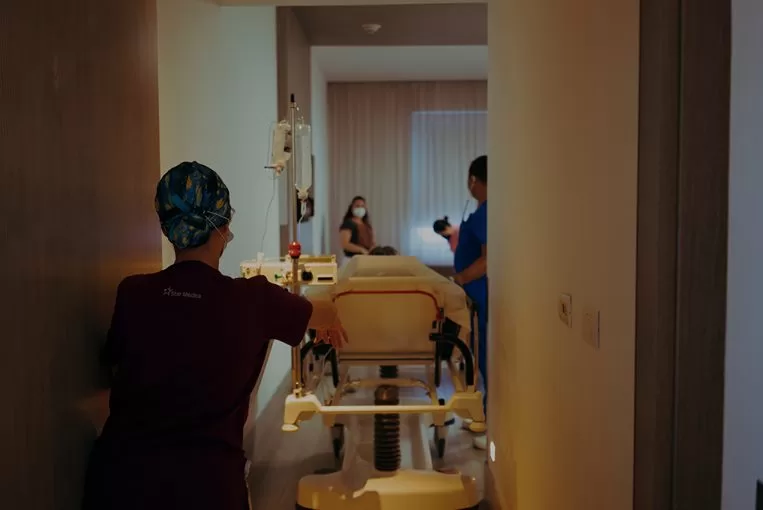For most people who were exposed to hepatitis C through their treatment products, the diagnosis experience was more than 30 years ago. If they were diagnosed as a child, it might have been their parents who received the test results and they might not have been certain whether they still had hepatitis C until they were older.
John had hepatitis C as a child and cleared the virus naturally. He talked about his experience.
BEING DIAGNOSED
‘It was in the early 1980s and not much was known about hep C at the time. I was a kid, around 9 or 10 years old, and when I was passing dark brown urine like tea. My parents thought that wasn’t right and sent me off to hospital. They ran tests and diagnosed that I had what was called non-A non-B hepatitis.
‘I lost heaps of weight during that time and was very jaundiced and yellow. I can’t remember how long I was crook for, but I was in hospital for two or three weeks. After that I had to get back up to strength and put weight back on and try to get back to normal.’
Although John and his parents didn’t speak much about it over the years, he found out later that his time in hospital was traumatic for all of them.

‘I recall it being a bit like COVID times. I was in isolation in my own room and wasn’t really allowed visitors. My room had a glass window and my parents could only wave to me or speak to me from the outside of the window. The nurses and doctors were masked up as well.
‘It was very daunting and scary as a kid. I was so young and didn’t know if I was going to survive the whole ordeal. And I still have mixed emotions when I think about how I obtained the virus through my blood products. You take a certain treatment for an illness that you think is going to save your life and then you end up with another life-threatening virus or condition because of it. But I am probably one of the lucky ones. Other people got HIV. I cleared hep C naturally and I didn’t get HIV as well.’
Many years later, when John was celebrating a personal milestone, his normally stoic father was overwhelmed by the contrast between the happy occasion and the memory of John’s hepatitis C scare and broke down.
‘He said he wasn’t sure I was going to survive,’ said John.
CLEARING THE VIRUS
Although John isn’t sure when he cleared the virus, he has had several occasions where his HCV RNA tests have confirmed that he no longer has the virus in his bloodstream.
‘I had to obtain a few doctor’s reports for one reason or another and they specified that I was diagnosed with hep C in my childhood but had cleared the virus spontaneously and this was verified in blood tests.’

Among the tests for hep C was preparation for IVF, when John and his wife were undertaking pre-genetic diagnosis for haemophilia before becoming pregnant. John commented that the IVF doctors identified that he had been exposed to hepatitis C but could also see that he had cleared the virus.
WHAT DO THE TESTS MEAN?
There are two types of blood tests to diagnose hep C.
Hep C antibody test
Positive result – shows you have had a hepatitis C infection at some stage in your life but not whether you still have hep C.
Negative result – shows you have never been exposed to hep C.
Hep C RNA test
This test is carried out if you have a positive hep C antibody test.
Positive result – shows you still have hepatitis C.
Negative result – shows you no longer have hepatitis C.
For more information, visit Testing for hep C (Hepatitis Australia)
STIGMA
Stigma relating to hep C remains an issue for many affected people with bleeding disorders. For John, there is often no good reason to tell other people that he had hep C as a child:
‘I cleared it naturally. it’s a thing in the past and doesn’t affect my day-to-day life anymore.’
However, he is conscious that he has told very few people in his life – only personal relationships and very close family and family friends – because of the stigma. This was influenced greatly by his experiences as a child.
‘I was in primary school when it all came out in the news that haemophiliacs had been infected with HIV or hep C through blood products. Obviously, my classmates knew I had haemophilia and there was the stigma of them thinking do I have HIV or hep C. I didn’t disclose having hep C at the time to my classmates. It was a bit daunting and I was worried whether I would be treated as an outcast, and by their parents as well. So that wasn’t a very pleasant time. I kept it to myself. My parents probably told a few close friends but that was it. It was never spoken about outside that circle. And I thought their friends were a bit stand-offish towards me after that. The stigma is a big thing, even in this day and age.’
LIVER HEALTH CHECKS
Keeping on top of his liver health is something that John takes seriously. There are several factors that contribute to liver health, not just hepatitis C – for example, being overweight or drinking a lot of alcohol or other health conditions. And even those who have cleared hep C will need ongoing liver health monitoring if they have already developed more severe liver scarring like cirrhosis.
John encouraged others to have any tests that are recommended for them individually and to have hep C treatment if they haven’t already.
‘Liaise with your treating doctor and see if you need more tests. Because there are treatments now that can cure hep C in a short time if you still have the virus. Treatment has definitely come a long way from the early days.
‘Keep an eye on your liver. Even though you might have been exposed to hep C 30 or 40 years ago and you might have cleared the virus, it can still have some ramifications later in life – because there are occasions where it can lead to cirrhosis or liver cancer. So it’s good to keep an eye on your liver and get any tests that you need, just to make sure there are no long-term consequences.’
For more information visit Living with cirrhosis (Hepatitis Australia)



